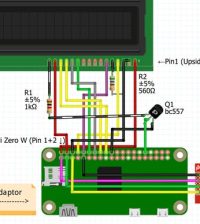- How to Adjust X and Y Axis Scale in Arduino Serial Plotter (No Extra Software Needed)Posted 4 months ago
- Elettronici Entusiasti: Inspiring Makers at Maker Faire Rome 2024Posted 4 months ago
- makeITcircular 2024 content launched – Part of Maker Faire Rome 2024Posted 7 months ago
- Application For Maker Faire Rome 2024: Deadline June 20thPosted 8 months ago
- Building a 3D Digital Clock with ArduinoPosted 1 year ago
- Creating a controller for Minecraft with realistic body movements using ArduinoPosted 1 year ago
- Snowflake with ArduinoPosted 1 year ago
- Holographic Christmas TreePosted 1 year ago
- Segstick: Build Your Own Self-Balancing Vehicle in Just 2 Days with ArduinoPosted 1 year ago
- ZSWatch: An Open-Source Smartwatch Project Based on the Zephyr Operating SystemPosted 1 year ago
Microsoft made its AI work on a Raspberry Pi

The idea came about from Microsoft Labs teams in Redmond and Bangalore, India.
Ofer Dekel, who manages an AI optimization group at the Redmond Lab, was trying to figure out a way to stop squirrels from eating flower bulbs and seeds from his bird feeder.
As one does, he trained a computer vision system to spot squirrels, and installed the code on a $35 Raspberry Pi 3. Now, it triggers the sprinkler system whenever the rodents pop up, chasing them away.
To make it work on systems that often have just a few kilobytes of RAM, the team compressed neural network parameters down to just a few bits instead of the usual 32. Another technique is “sparsification” of algorithms, a way of pruning them down to remove redundancies. By doing that, they were able to make an image detection system run about 20 times faster on a Raspberry Pi 3 without any loss of accuracy.
Microsoft’s researchers are working on a few projects for folks with impairments, like a walking stick that can detect falls and issue a call for help, and “smart gloves” that can interpret sign language. To get some new ideas and help, they’ve made some of their early training tools and algorithms available to Raspberry Pi hobbyists and other researchers on Github.
“Giving these powerful machine-learning tools to everyday people is the democratization of AI,” says researcher Saleema Amershi.















